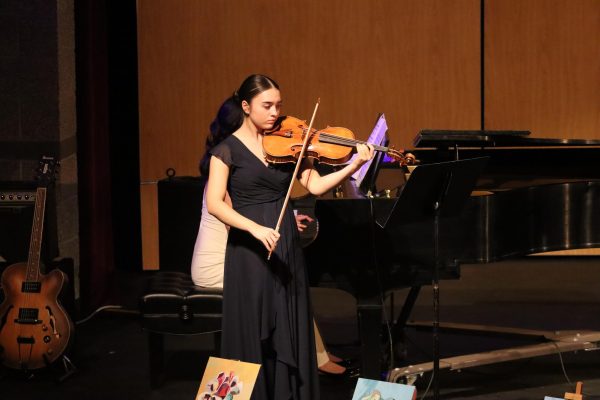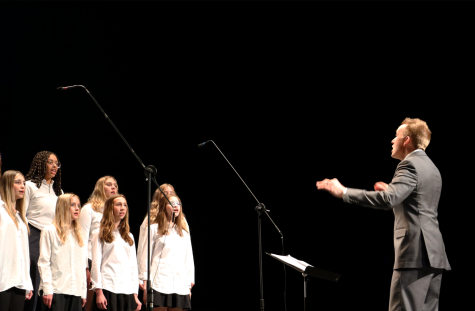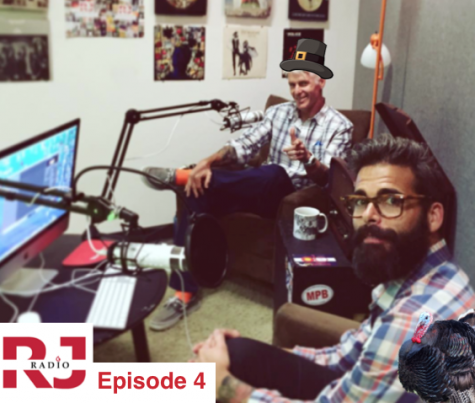Reaching for the Stars with Brother Guy Consolmagno, SJ: Vatican Astronomer
It is quite an accomplishment to serve as the Director of the Vatican Observatory. Participating in the N.A.S.A. team that determined Pluto cannot be considered a planet is remarkable, and having an asteroid named after you is, needless to say, exceptional. Though all of these illustrate Br. Guy Consolmagno, S.J., the characteristic he boasts most of is his love of science fiction. During a visit to Regis Jesuit, Br. Guy dropped in on science and theology classes, spoke at an all-school assembly, and hosted an evening presentation answering the question: does science need faith? In between sessions, Br. Guy visited RJ Media and shared his thoughts on everything from Star Wars to finding one’s vocation.
Br. Guy Consolmagno grew up in rural Michigan and began looking to the stars at a young age.
“I was in kindergarten when Sputnik was launched, and I was finishing high school when people landed on the moon, so space was in the air,” he said. It was at M.I.T. where Br. Guy first discovered his knack for astronomy. “I first decided to go to M.I.T. because my best friend was going there and they had a great science fiction library, and I love adventures, and planets are places where people have adventures,” he remarked. “In the geology department, I took a class in meteorites, and the idea that you could actually touch stuff that had come from outer space- this is so exciting! I’m so excited about it to this day and that was fifty years ago.”
Br. Guy’s enthusiasm for astronomy is infectious. Beyond his passion for his work, however, is his impressive knowledge of space. Before his promotion to director of the Vatican Observatory, Br. Guy was the curator of one of the world’s largest meteorite collections. The collection is made up of 1,200 meteorites, each of which has been carefully studied by Br. Guy and the current curator, Br. Bob Mackey.
Either of these men could have easily taken high-paying jobs at N.A.S.A. or similar organizations, but they chose the Society of Jesus.
Br. Guy explained, “When I was being interviewed and the interviewer of the Jesuits said, ‘Why do you want to be Jesuit?’ And I looked at him and I said, ‘Well, they’re the best, you know. Why would I go anywhere else?’ I had been to a Jesuit high school. I had attended the Jesuit high school in Detroit, (University of Detroit) High, so I knew the Jesuits from there. I also knew that the Jesuits have lots of universities, and I’m a nerd. I know that the kind of work I’m good at doing is nerd work.”
This self-realization, however, came with it’s fair share of challenges for Br. Guy.
“I’ve tried working with the poor. I spent time in the Peace Corps. I spent time in inner-city places, and it was really valuable for me. I’m not convinced I did a whole lot of good for the people I was working with because I’m a nerd. And so, I wanted an order that was well-matched to what I was interested in, what I was good at,” he observed.
Br. Guy is a perfect example of one who has found his vocation and pursued it. For those struggling to uncover their ‘calling,’ he says, “One of the things they never tell you about in religion: God wants you to be happy. He gives you talents, and you’re supposed to develop those talents.”
Still, developing one’s talents can prove difficult.
With wonder in his eyes, Br. Guy explained that daydreaming is the most important step in the journey to discover one’s purpose. He insisted, “Learn how to daydream, but don’t end when you have everything going right. Then say to yourself, ‘Alright. So here I am…Now what do I do?’ Now what are the things I’m gonna have to fix? Now what will it really be like? How am I gonna feel ten years later? Daydream, and then watch your reaction afterwards.”
This type of contemplation is expressed by St. Ignatius in Ignatian Spirituality, a form of prayer the Regis Jesuit community participates in every day through the Daily Examen.
Daydreaming has certainly worked for Br. Guy as he continues to explore and make new discoveries regarding the nature of space on a daily basis. But that is not always effortless in Rome at the Vatican Observatory.
Br. Guy’s schedule as a Vatican Astronomer is nothing short of restless. At 6:00 a.m., he prays with the help of a rosary given to him by Pope Francis, drinks a little espresso that serves as breakfast, and goes to his office until the commencement of his daily meetings.
“[(My colleagues and I] all find out what everybody else is doing ‘cause science and astronomy in general- you do a lot of it by yourself in your office, and you can sort of lose track of reality, so it’s good to get everybody out to talk about that.”
After more cappuccinos, Br. Guy begins his laboratory work until about 1:00 p.m. “That’s often when I do my writing, because I’m still awake and there’s a lot that goes into being a scientist whether it’s writing letters to people or writing documents about what you’ve done, or what I wind up doing a lot of is writing popular articles about science and faith.” Community prayer, Pranzo (the big meal of the day), and a much needed nap is followed by a stroll and more prayer in the Papal Gardens at 5:00 p.m. It is then that Br. Guy begins to answer emails from America.
“I have the work in Rome where I can do my own work in the morning and then the work with the people in America in the evening,” he explains. After community Mass and a light dinner at 7:30, Br. Guy may return to his office for the third time. To nobody’s surprise, he reads science fiction when he has any free time. All in all, he says, “It’s a pretty good life.”
His long hours of work yield new scientific insight into the universe as well as the relationship between science and faith. Can science and faith, two seemingly contrasting entities, coexist?
Br. Guy argues, “You cannot have any logical system without axioms. Euclid had 17 axioms that allowed him to do geometry. To me, faith in those axioms is what makes the rational process of science possible. You have to believe that there is a physical universe…You have to believe that there are laws of physics to be found. Somebody had to believe that before we knew any laws of physics.”
Science and faith do not just coexist, they are dependent on each other.
On his personal faith journey and ability to find God in his work, Br. Guy exclaims, “I am playing a game with God. God has set up the puzzle, it’s up to me to solve it and when I get some progress made I can hear Him going, ‘Yeah! Isn’t that cool! Now let me show you the next step.’ That’s why doing science is an act of worship. It’s an act of love. It’s God revealing himself in the universe…Science needs that faith. It needs that joy, or it wouldn’t happen.”







